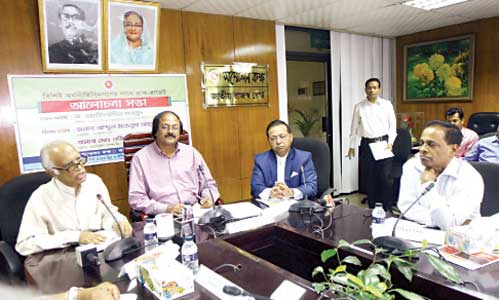An economist and a top business leader on Sunday suggested that the National Board of Revenue consider the prevailing economic situation in the country before implementing the new value-added tax act.
At a pre-budget discussion held at the NBR headquarters in Dhaka, they also suggested that the revenue board conduct study before taking any tax measure instead of relying only on what the businesses demand for.
The NBR started pre-budget discussion with stakeholders on the day for taking recommendations from them as part of preparation of the revenue budget for the next fiscal year of 2016-2017.
‘The revenue board should keep balance between the existing reality and the ideal tax structure in implementing the new VAT act which is scheduled to come into force from July ,’ said economist Wahiduddin Mahmud, also chairman of the Economic Research Group.
The NBR is going to implement some reform initiatives including implementation of the new VAT and Supplementary Act-2012 and online VAT payment system from the next fiscal year.
According to the act, a uniform 15 per cent VAT will be applicable for all sectors instead of the existing multiple VAT rates for different sectors. There will also be no package VAT system for small traders.
‘The NBR should consider the both sides. Becoming overenthusiastic, it should not do anything that may push it backward from where it is now,’ he said.
The revenue board should assess the impact of any sudden shift to a new system, he said.
Federation of Bangladesh Chambers of Commerce and Industry president Abdul Matlub Ahmad said that the revenue board should consider whether it would be able to bring such huge changes in the VAT structure particularly for small and new traders while the country’s overall tax system was very complicated.
Wahiduddin also suggested that the tax officials shun the thought that all taxpayers are dishonest and evade taxes.
The economist also emphasised strengthening payroll tax system for salaried persons for ensuring proper tax collection from them.
He also suggested that the NBR consider the possibility of introducing actual property tax system examining the holding tax collection system of the municipalities.
He said that the private sector and consumers did not get the benefit of the falling oil price on the international market as the government did not adjust the prices of the commodity at the domestic market.
The fall in the price of oil on the international market gave the government benefit worth Tk 20,000 to Tk 25,000 crore in the budget, he said.
Policy Research Institute chairman Zaidi Sattar said that taxation measures should be export-oriented to facilitate export from the country.
Many tax protection measures discourage export, he said.
Bangladesh Institute of Development Studies senior research fellow Nazneen Ahmed said that import duty on finished goods should be higher than that on raw materials.
PricewaterhouseCoopers Bangladesh managing partner Mamun Rashid said that the NBR should conduct study before changing any tax measure.
NBR member (VAT policy) Jahangir Hossain sought advices from researchers and economists on some challenges in implementation of the new VAT law.
He said that range of VAT exemption and tariff line would be very limited in the new VAT law which might hurt local producers while standard VAT rate would also hurt consumers.
NBR chairman Md Nojibur Rahman presided over the meeting.
Source: New Age










